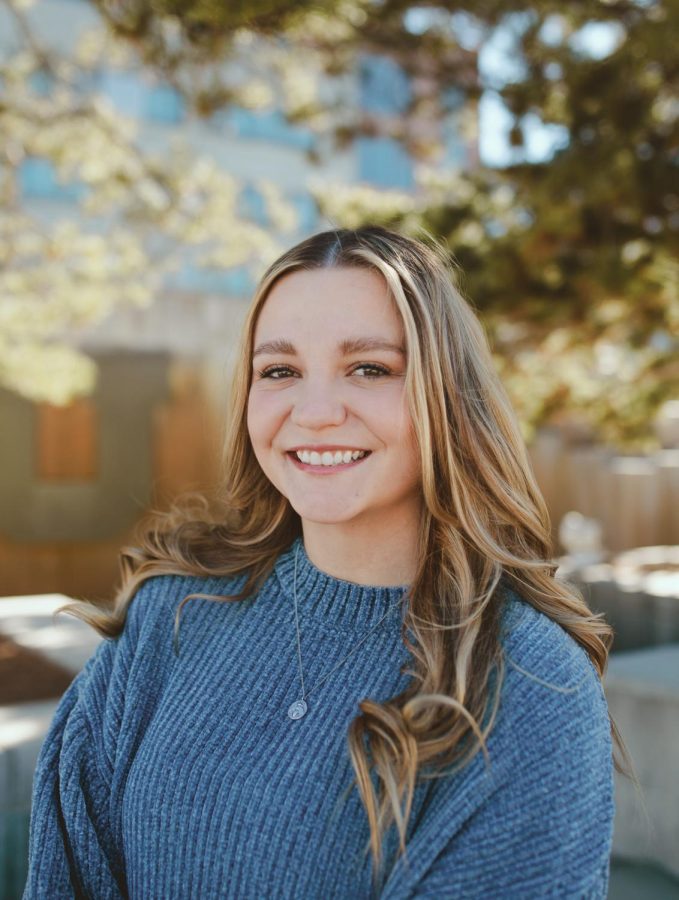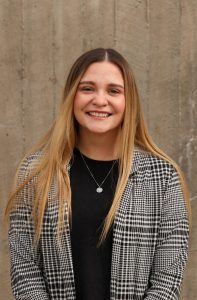Nielsen: Our Work is Far From Done — The Importance of Collegiate Investigative Journalism
Portrait of Porshai Nielsen in front of the fountain by the J. Willard Marriott Library in Salt Lake City on March 23, 2022. (Photo by Emily Rincon | The Daily Utah Chronicle)
April 29, 2022
A fortune cookie brought me here. Four years ago, I was a miserable pre-nursing major that knew nursing was not my passion. I needed change and knew that I wanted to write. When I had started looking into switching my major to journalism, I went on a date to Dragon Diner in Millcreek, and there I opened a fortune cookie that said “make the change.”
I’ve seen first-hand the power and importance of investigative journalism on college campuses during my time at the Daily Utah Chronicle. I know my investigative work has been an essential way for me to create change on campus and that it will continue to be a force for change in the years to come.
Post fortune cookie, I left the University of Utah, moved to Thailand and enrolled in online classes at Salt Lake Community College. After taking some time off to work on myself, I was able to make the full transition and enroll in Intro to News Writing. It was there that my professor, Marcie Young-Cancio, taught me every foundational skill of journalism. Young-Cancio introduced me to the book “She Said” by Jodi Kantor and Megan Twohey. It’s the story of two Pulitzer prize-winning reporters who exposed the Harvey Weinstein scandal through their work as investigative journalists. It’s also the book that inspired me to go into investigative journalism.
Shortly after writing for SLCC’s newspaper, the Globe, and finishing my associate’s degree, I transferred back to the U and immediately applied to write for the Chronicle. At that point, there wasn’t an investigative desk, so I opted for the news desk. While writing on the news desk, I attended multiple protests against various injustices. At every protest I went to, whether it pertained to climate change, women’s rights or Black Lives Matter, I was inspired by everyone around me working for change.
My transition from the news desk to the investigative desk was not easy. My Editor-in-Chief, Sheely Edwards, helped me build it back from the dead. A part of this building process included collecting a document of running pitches — ideas for potential stories for my then non-existent writers to work on. Within days, my running pitches had grown into 15-20 ideas just from looking around our campus and talking with fellow students. It became immediately apparent that there were injustices on campus within every major, industry and discipline. From concerns regarding pay for students working on campus to unfair parking citations, all the way to how poorly higher educational institutions are built for minority students.
I have been lucky enough to hire three passionate writers, who have dug into these issues on behalf of the student body. Together, we have published stories regarding animal abuse happening in labs, the 70 bicycles stolen on campus last year, Housing and Residential Education’s poor treatment of Resident Advisors and more. While all of that work mentioned is important, our work is far from done. Being one of the only student newspapers with an entire desk dedicated to investigative journalism is one of the ways we can make the U a safer place for students.
The Chronicle offers the perfect place for investigative journalism. It provides a safe haven for journalists to do investigative work. The Global Investigative Journalism Network says that college newsrooms “provide the support needed to undertake complex investigations as newspaper closures and shrinking budgets impede costly reporting projects.”
Our newspaper is independent of the university and gives student journalists the opportunity to work on whatever they would like, even if it impedes the university’s image. Brigham Young University’s newspaper, the Daily Universe, does not have the same freedoms as they are “tied to the curriculum of the journalism sequence in the BYU School of Communications and is committed to the mission of BYU and its sponsoring institution, The Church of Jesus Christ of Latter-day Saints.”
Institutions of higher education are deeply flawed and the U is no exception. From the way minority students are treated and university police ignoring complaints, to how donations and funding are used, there will always be situations and people that need investigating at the U. For college investigative journalists, it may seem as if you’re only ever working for the resume credit or for the next internship, but the potential of work to be done here will never end. And if we don’t do it, who will?
Too often people believe that once you publish an exposé or an important story the work has been completed. If there is one thing that I have learned, it’s that the work of investigative journalism never ends. Kantor and Twohey wrote in “She Said,” “There isn’t ever going to be an end. … The point is that people have to continue always speaking up. And not being afraid,” and that’s exactly what the U needs.









